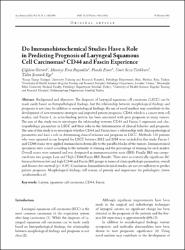Do immunohistochemical studies have a role in predicting prognosis of laryngeal squamous cell carcinomas? CD44 and fascin experience
Citation
Öztürk, Ç., Paşaoğlu, H. E., Emre, F., Tetikkurt, Ü. S., & Şentürk Ege, T. (2022). Do immunohistochemical studies have a role in predicting prognosis of laryngeal squamous cell carcinomas? CD44 and Fascin experience. Acta bio-medica : Atenei Parmensis, 92(6), e2021309. https://doi.org/10.23750/abm.v92i6.10432Abstract
Background and objectives: The diagnosis of laryngeal squamous cell carcinoma (LSCC) can be made easily based on histopathological findings, but the relationship between morphological findings and prognosis is not clear. In addition to morphological findings, the use of novel markers may contribute to the development of new treatment strategies and improved patient prognosis. CD44, which is a cancer stem cell marker, and Fascin-1, an actin-binding protein has been associated with poor prognosis in many tumors. The aim of this study was to investigate the relationship between CD44 and Fascin-1 expression and clin-icopathologic parameters in LSCC and their roles in the determination of clinical behavior and prognosis. The aim of this study is to investigate whether CD44 and Fascin have a relationship with clinicopathological parameters and have a role in determining clinical behavior and prognosis in LSCC. Methods: 130 patients who were operated in our hospital for LSCC between 2012 and 2018 were included in this study. Fascin-1 and CD44 stains were applied immunohistochemically to the paraffin blocks of the tumors. Immunostained specimens were scored according to the intensity of staining and the percentage of staining for each marker. Overall scores were summed and was designated as immunoreactivity score (IRS). Finally, IRS was catego-rized into two groups; Low and High CD44/Fascin IRS. Results: There were no statistically significant differences between low and high CD44 and Fascin IRS groups in terms of clinicopathologic parameters, overall and disease-free survival (p> 0.05). Conclusion: Immunhistochemical studies are not yet sufficient to predict patient prognosis. Morphological findings still remain of priority and importance for pathologists.


















